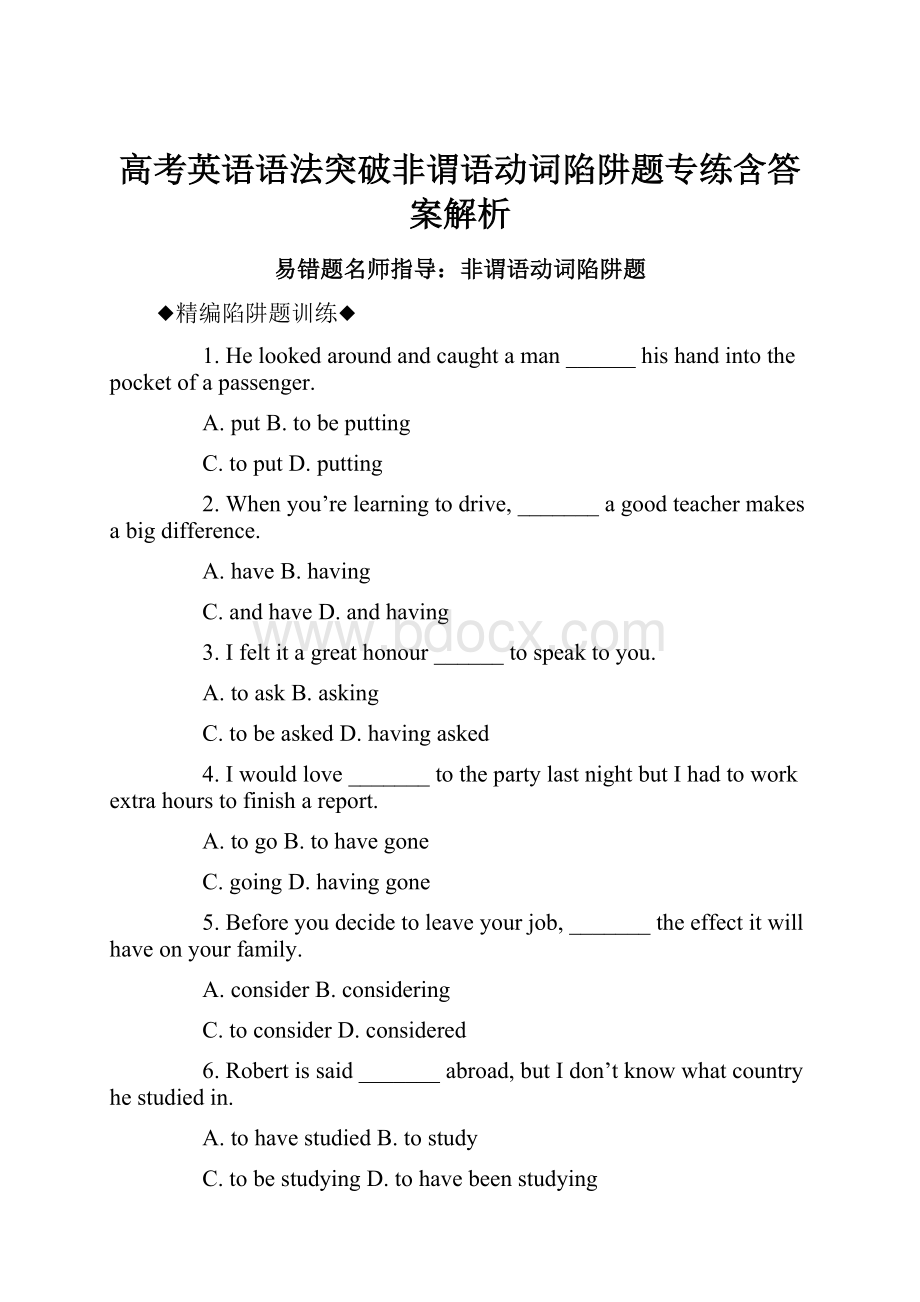高考英语语法突破非谓语动词陷阱题专练含答案解析.docx
《高考英语语法突破非谓语动词陷阱题专练含答案解析.docx》由会员分享,可在线阅读,更多相关《高考英语语法突破非谓语动词陷阱题专练含答案解析.docx(12页珍藏版)》请在冰豆网上搜索。

高考英语语法突破非谓语动词陷阱题专练含答案解析
易错题名师指导:
非谓语动词陷阱题
◆精编陷阱题训练◆
1.Helookedaroundandcaughtaman______hishandintothepocketofapassenger.
A.putB.tobeputting
C.toputD.putting
2.Whenyou’relearningtodrive,_______agoodteachermakesabigdifference.
A.haveB.having
C.andhaveD.andhaving
3.Ifeltitagreathonour______tospeaktoyou.
A.toaskB.asking
C.tobeaskedD.havingasked
4.Iwouldlove_______tothepartylastnightbutIhadtoworkextrahourstofinishareport.
A.togoB.tohavegone
C.goingD.havinggone
5.Beforeyoudecidetoleaveyourjob,_______theeffectitwillhaveonyourfamily.
A.considerB.considering
C.toconsiderD.considered
6.Robertissaid_______abroad,butIdon’tknowwhatcountryhestudiedin.
A.tohavestudiedB.tostudy
C.tobestudyingD.tohavebeenstudying
7.ItissaidthatinAustraliathereismorelandthanthegovernmentknows_______.
A.itwhattodowithB.whattodoitwith
C.whattodowithitD.todowhatwithit
8.Anyone_______bags,boxes,orwhatever,wasstoppedbythepolice.
A.seencarryB.seencarrying
C.sawtocarryD.sawcarrying
9.MrReedmadeuphismindtodevoteallhehadto_______someschoolsforpoorchildren.
A.setupB.settingup
C.havesetupD.havingsetup
10.Thediscoveryofnewevidenceledto_______.
A.thethiefhavingcaughtB.catchthethief
C.thethiefbeingcaughtD.thethieftobecaught
11.Shelooksforwardeveryspringto_______theflower-linedgarden.
A.visitB.payingavisit
C.walkinD.walkingin
12.Totesteggs,_______theminabowlofwater:
iftheyfloatthey’rebad,iftheysinkthey’regood.
A.putB.putting
C.toputD.tobeputting
13.“WhereisDavid?
”“Heisupstairs______readytogoout.”
A.togetB.getting
C.tobegettingD.havinggot
14.“Mum,whydoyoualwaysmakemeeataneggeveryday?
”“________enoughproteinandnutritionasyouaregrowingup.”
A.GetB.Getting
C.TogetD.tobegetting
15.Hewasreadinghisbook,completely_______totheworld.
A.lostB.losing
C.toloseD.tohavelost
16.Welookedeverywhereforthekeys,buttheyarenowhere_______.
A.tofindB.tohavefound
C.tobefoundD.beingfound
17.Theboywantedtoridehisbicycleinthestreet,buthismothertoldhim_______.
A.nottoB.nottodo
C.notdoitD.donotdo
18.Acookwillbeimmediatelyfiredifheisfound_______inthekitchen.
A.smokeB.smoking
C.tosmokeD.smoked
19.Findinghercarstolen,_______.
A.apolicemanwasaskedtohelp
B.theareawassearchingthoroughly
C.itwaslookedforeverywhere
D.shehurriedtoapolicemanforhelp
20.“Howdoyoudealwiththedisagreementbetweenthecompanyandthecustomers?
”“Thekey______theproblemistomeetthedemand______bythecustomers.”
A.tosolving,makingB.tosolving,made
C.tosolve,makingD.tosolve,made
21.“WhatdoyouthinkmadeMarysoupset?
”“_______hernewbike.”
A.AsshelostB.Lost
C.LosingD.Becauseoflosing
22.Theresearchissodesignedthatonce_______nothingcanbedonetochangeit.
A.beginsB.havingbegun
C.beginningD.begun
23.Though________money,hisparentsmanagedtosendhimtouniversity.
A.lackedB.lackingof
C.lackingD.lackedin
24.Tonywasveryunhappyfor_______totheparty.
A.havingnotbeeninvitedB.nothavinginvited
C.havingnotinvitedD.nothavingbeeninvited
25.ThoughIhaveoftenheardthissong_______.Ihaveneverheardyou_______it.
A.beingsung,sangB.sang,singing
C.sung,singD.tobesung,tosing
26.Heisamanoffewwords,andseldomspeaksuntil_______to.
A.spokenB.speaking
C.speakD.bespoken
28.WhenIhandedthereporttoJohn,hesaidthatGeorgewastheperson_______.
A.tosendB.forsendingit
C.tosendittoD.forsendingitto
29._______ontime,thismedicinewillbequiteeffective.
A.TakingB.Beingtaken
C.TakenD.Havingtaken
30.Thefilmstarwalkedtohiscar,______acrowdofjournalists.
A.followedbyB.followingby
C.tofollowD.tobefollowedby
31.Afterdescribingtheplannedimprovements,shewenton_______howmuchtheywouldcost.
A.toexplainB.explaining
C.tobeexplainingD.havingexplained
32.Pleaseexcuseme_______yourletterbymistake.
A.toopenB.tohaveopened
C.foropeningD.inopening
33.Pleaseremember_______theplantswhileI’maway.
A.wateringB.tobewatering
C.towaterD.beingwatering
34.CertainlyIpostedyourletter—Iremember______it.
A.postingB.topost
C.tobepostingD.haveposted
35.Stop_______metohurryup.Icanonlygosofast.
A.totellB.telling
C.tohavetoldD.havingtold
36.Remember_______offthelightwhen_______tobed.
A.turning,goingB.toturn,togo
C.turning,togoD.toturn,going
37._______time,he’llmakeafirst-classtennisplayer.
A.HavinggivenB.Togive
C.GivingD.Given
38._______in1636,HarvardisoneofthemostfamousuniversitiesintheUnitedStates.
A.BeingfoundedB.Itwasfounded
C.FoundedD.Founding
39.Theladysaidshewouldbuyagiftforherdaughterwiththe________.
A.20dollarsremainedB.20dollarstoremain
C.remained20dollarsD.remaining20dollars
40.Thepicture_______onthewallispaintedbymynephew.
A.havinghungB.hanging
C.hangsD.beinghung
41.Withalotofdifficultproblems________,thenewly-electedpresidentishavingahardtime.
A.settledB.setting
C.tosettleD.beingsettled
42.Havingatripabroadiscertainlygoodfortheoldcouple,butitremains_______whethertheywillenjoyit.
A.toseeB.tobeseen
C.seeingD.seen
43.Tonywasveryunhappyfor_______totheparty.
A.havingnotbeeninvitedB.nothavinginvited
C.havingnotinvitedD.nothavingbeeninvited
44.“Goodmorning.CanIhelpyou?
”“I’dliketohavethispackage_______.”
A.beweighedB.tobeweighed
C.toweighD.weighed
45.Whathavewesaid_______hersohappy?
A.makesB.tomake
C.madeD.hasmade
46.Whatworriedthechildmostwas______tovisithismotherinthehospital.
A.hisnotallowingB.hisnotbeingallowed
ChisbeingnotallowedD.havingnotbeingallowed
47.“Whichsweaterisyours?
”“Theone_______No.9.”
A.thatmarkedB.wasmarkedwith
C.whichmarkedD.markedwith
48.Ifthecarwon’tstart,_____it.
A.trypushB.trypushing
C.totrypushingD.totrytopush
49.Theystayedupuntilmidnight_____theoldyearoutandthenewyearin.
A.andsawB.tosee
C.seeingD.forseeing
【答案与解析】
1.选D。
catchsbdoingsth意为“碰上某人在做某事”或“逮住某做某事”。
2.选B。
这是一个含when引导时间状语从句的主从复合句,havingagoodteacher在主句中用作主语。
3.选C。
句中的it为形式主语,不定式tobeaskedtospeaktoyou为真正主语,因“我”与ask为被动关系,故用被动式。
4.选B。
like和love后接不定式或动名词均可,但wouldlove/like后只能接不定式,据此可排除选项C、D。
表示过去未曾实现的愿望,其后要接不定式完成式,即选B。
5.选A,before引导的是时间状语从句,填空句为主句,而此主句为一祈使句,故动词用原形。
其中itwillhave…为修饰名词theeffect的宾语从句。
6.选A。
根据句中的studied可知,他曾到国外留过学,也就是说“留学”这个动作已结束并发生在谓语动作(issaid)之前,故用完成式,即选A。
7.选C。
dowith与what连用可以表示“处置”、“放置”、“利用”等。
如:
WhatshallIdowithit?
怎样处置它好呢?
Whathaveyoudonewithmyumbrella?
你把我的雨伞放到哪里去了?
Idon’tknowwhattodowiththisstrangeobject.我不知道这怪东西有什么用。
8.选B。
anyoneseencarryingbags…为anyonewhowasseencarryingbags之略,其中过去分词短语seencarryingbags…用作定语修饰代词anyone。
另外,句中的whowasseencarryingbags为seesbdoingsth这一结构的被动式。
9.选B。
devote…to…的意思是“把……贡献给……”或“致力于……”,其中to是介词,不是不定式符号,若后动词要用动名词。
句中的hehad为定语从句,用以修饰all,注意不将hadto视为同一个语义结构。
10.选C。
leadto意为“导致”,其中的to是介词,不是不定式符号,若后接动词要用动名词。
由于逻辑主语thethief与catch为被动关系,故答案选C。
11.选D。
lookforwardto意为“期盼”,其中to是介词,后接动词要用动名词。
注意不能选B,因为payavisit不能带theflower-linedgarden作宾语,假若在payingavisit后加上介词to,则可选B。
12.选A。
句首的totesteggs为目的状语,填空句为祈使句谓语,故要用动词原形。
13.选B。
现在分词短语表伴随。
14.选C。
togetenoughproteinandnutrition表目的。
15.选A。
(be)losttosth为习语,意为“不再受某事物的影响”、“将某事物置之度外”。
16.选C。
因keys与find是被动关系。
17.选A。
不定式的否定式总是将否定词not置于不定式符号to之前,而不能置于其后,同时结合tellsb(not)todosth这一结构可排除选项C、D。
当不定式的动词是前面已出现过的相同的动词时,为避免重复,通常省略该不定式而只保留不定式符号to。
18.选B。
find后可接现在分词(表示动作在进行)或过去分词(表被动关系)作宾语补足语,但是不接不定式。
另外,由于he与smoke是主动关系,故选B。
19.选D。
非谓语动词作状语时,其逻辑主语就是句子主语。
比较四个选项,findinghercarstolen的逻辑主语显然是she,而不是apoliceman,thearea,it等,故选D。
20.选B。
thekeyto…意为“……的关键”,其中的to是介词,不是不定式符号,若后接动词要用动名词。
另一方面,名词demand与make是被动关系(makedemands提出要求),同时根据句中的bythecustomers,可确定答案选B。
21.选C。
答句是针对疑问词what的回答,而问句中的疑问词what在句中用作主语,所以答句也应是一个能用作主语的东西,比较四个选项,只有C合适。
其完整回答形式为LosinghernewbikemadeMarysoupset.比较,下面一题要填不定式,因为四个选项中只有Tochooseanewchairman能回答疑问词why:
“Whywasaspecialmeetingcalled?
”“______anewchairman.”
A.ChooseB.Choosing
C.TochooseD.Chosen
22.选D。
由于theresearch与begin是被动关系,故用过去分词begun。
Oncebegun可视为onceitisbegun之省略。
23.选C。
由于hisparents与lackmoney(缺钱)是主动关系,故用现在分词,又因为lack是及物动词,故后接宾语无需用介词,故选C。
24.选D。
非谓语动词的否定式要将否定词not放在整个非谓语动词之前,据此可排除A、C。
另外,由于Tony与invite是被动关系,故选D。
25.C。
第一空填sung,因为song与sing是被动关系;第二空填sing,因为you与sing是主动关系。
27.选A。
untilspokento可视为untilheisspokento之略。
28.选C,不定式短语tosenditto用作这语,修饰其前的名词theperson。
注意句尾的介词to不能省略,因为被修饰的名词theperson为介词to的逻辑宾语。
29.选C。
thismedicine与动词take为被动关系,故用过去分词。
30.选A。
从句意上看,人群跟在明星后面,反过来,明星便是被人群跟着。
31.选A。
goondoingsth=继续做同一事情,goontodosth=做完某事后续继做某事。
32.选C。
excusesbfordoingsth意为“原谅某人做了某事”。
33.选C。
rememberdoingsth=记住曾经做过的事,remembertodosth